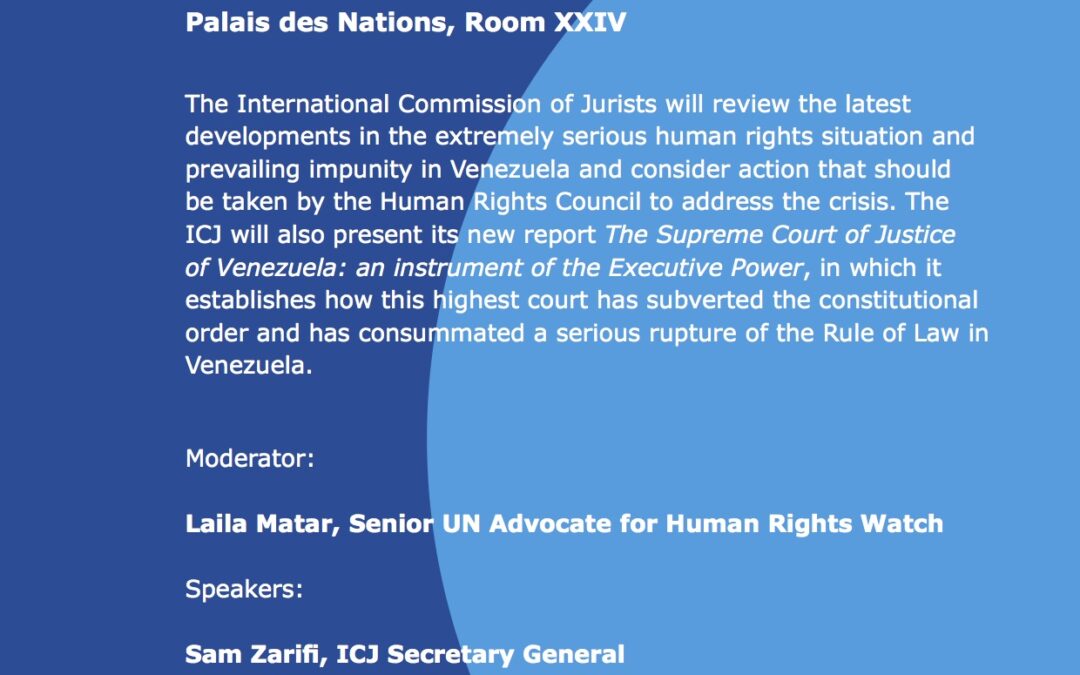
Sep 12, 2017 | Events, Multimedia items, News, Video clips
At a side event to the UN Human Rights Council session, the ICJ reviewed today the latest developments in Venezuela, highlighting the extremely serious human rights situation and prevailing impunity, and discussed action that should be taken by the Human Rights Council to address the crisis.
- Laila Matar, Senior UN Advocate, Human Rights Watch
Speakers:
- Sam Zarifi, ICJ Secretary General
- Carlos Ayala Corao, Venezuelan lawyer, ICJ Commissioner
- Federico Andreu Guzman, ICJ South America Representative
Watch the video:
https://www.facebook.com/ridhglobal/videos/10157079100584616/
For additional recent ICJ reports on Venezuela, click here.
The flyer for this event is available in PDF format by clicking here.
For more information, contact un(a)icj.org
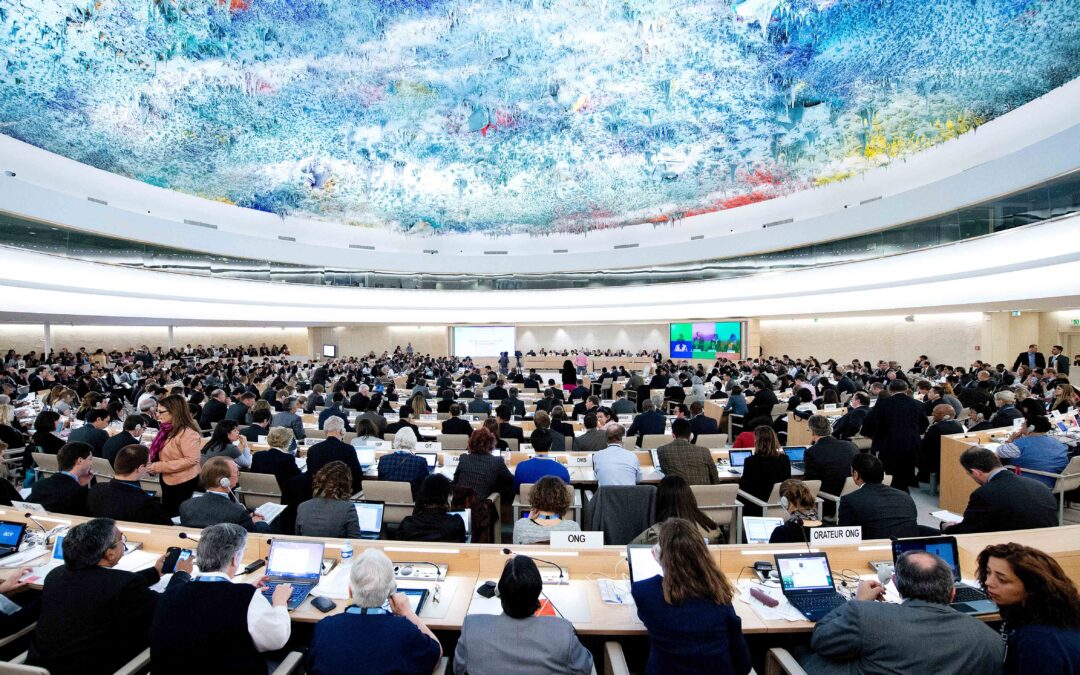
Sep 12, 2017 | Advocacy, Non-legal submissions
The ICJ today made an oral statement to the UN Human Rights Council, on the crisis for human rights and the rule of law in Venezuela.
The statement was made in general debate under item 2 on the oral update delivered by the High Commissioner for Human Rights.
The ICJ statement read as follows:
“The ICJ welcomes the efforts of the High Commissioner and his Office to document and draw attention to the situation in Venezuela, including through the report published on 30 August. As the High Commissioner highlighted, the situation only continues to worsen and the ICJ fully supports his call for the Council to establish an international investigation into human rights violations in Venezuela.
The deep human rights crisis and the breakdown of the rule of law in Venezuela is undoubtedly the most worrying situation in the American hemisphere.
Arbitrary detentions, extrajudicial and arbitrary executions, military trials of civilians and persecutions and harassments of opponents, dissidents and human rights defenders have become systematic and widespread practices.
The combined action of the Supreme Court of Justice, the Government and the National Constituent Assembly has destroyed the rule of law, suppressing the separation of powers, delivering a fatal blow to the Legislative, and seriously undermining independence and impartiality of the Judiciary.
The 1999 Constitution has de facto ceased to be in force and the road to arbitrary exercise of power has begun.
The ICJ considers that it is imperative that the Human Rights Council take action on this serious situation.”
The High Commissioner, in his oral update on 11 September, had stated as follows in relation to Venezuela:
“Last month my Office issued a report on Venezuela, highlighting excessive use of force by security officers, and multiple other human rights violations, in the context of anti-Government protests. There is a very real danger that tensions will further escalate, with the Government crushing democratic institutions and critical voices – including through criminal proceedings against opposition leaders, recourse to arbitrary detentions, excessive use of force, and ill-treatment of detainees, which in some cases amounts to torture. Venezuela is a Member State of this Council, and as such has a particular duty to “uphold the highest standards in the promotion and protection of human rights”, in the words of Resolution 60/251. My investigation suggests the possibility that crimes against humanity may have been committed, which can only be confirmed by a subsequent criminal investigation. While I support the concept of a national Truth and Reconciliation Commission, the current mechanism is inadequate. I therefore urge that it be reconfigured with the support and involvement of the international community. I also urge this Council to establish an international investigation into the human rights violations in Venezuela.”
The ICJ also launched today a new report on Venezuela, and convened a side event to discuss the need for action by the Human Rights Council.
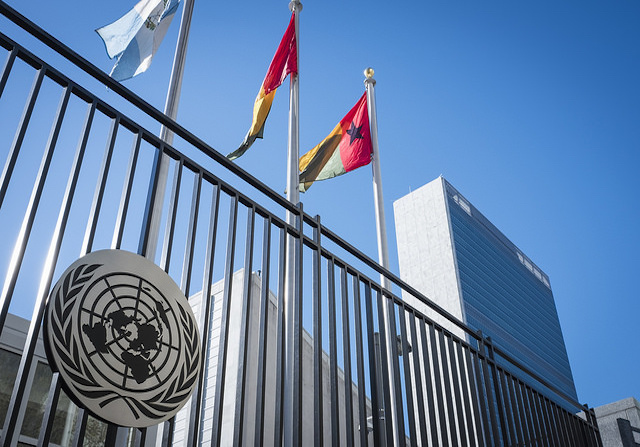
Jul 19, 2017
ICJ has joined other leading NGOs in calling on the UN to ensure its NGO Committee fulfils its duties of constructive dialogue with NGOs, after the Committee has failed to convene regular meetings with NGOs as required by its mandate.
Civil society has long held concern that certain political dynamics and working methods of the NGO Committee, including lack of transparency and dialogue, are serving more to obstruct rather than facilitate civil society engagement with the UN, particularly on human rights issues.
The letter therefore begins by welcoming the recent decision of the NGO Committee’s superior body, the ECOSOC, requiring the Committee to webcast its sessions.
As a next step towards improving the situation, the letter notes that the resolution that provides the mandate for the NGO Committee (ECOSOC resolution 1996/31), provides that the NGO Committee is ‘responsible for regular monitoring of the evolving relationship between NGOs and the UN’. The resolution specifically requires that the Committee ‘shall hold’ meetings with accredited NGOs before each of its sessions and at other times as necessary, to discuss ‘questions of interest to the Committee or to the organizations related to the relationship between NGOs and the United Nations.’ The resolution specifies that a report on such consultations is to be transmitted to ECOSOC for appropriate action.
As far as is known to the NGOs, no such meetings have been held, in recent years.
The letter affirms that regular meetings between the Committee and accredited NGOs are essential to build a more constructive relationship between the Committee (as well as the ECOSOC) and NGOs. They could help to address the wide range of challenges faced by NGOs in engaging with the UN.
The letter emphasises that, in the absence of formal opportunities to engage with the Committee, including during the meetings envisaged in resolution 1996/31, on issues of general concern, NGOs have sought to address the NGO Committee briefly at the start of Committee sessions. However, on the two most recent occasions these attempts have been rejected. The letter underlines that the Committee’s refusal to engage with NGOs on general topics of concern is in contradiction to its responsibilities outlined in resolution 1996/31.
Affirming ECOSOC’s duty to ensure that the Committee fulfils its responsibilities fully and effectively, the NGOs therefore request that the ECOSOC remind the NGO Committee of its responsibility to convene at least one meeting with NGOs before each session, beginning with its next session in January 2018.
The full letter may be downloaded in PDF format here: UN-OpenLetter-ECOSOC-NGOCommittee-2017
(photo credit: UN Photo/Manuel Elias, 20 April 2016, creative commons licence, https://www.flickr.com/photos/un_photo/26772166976)
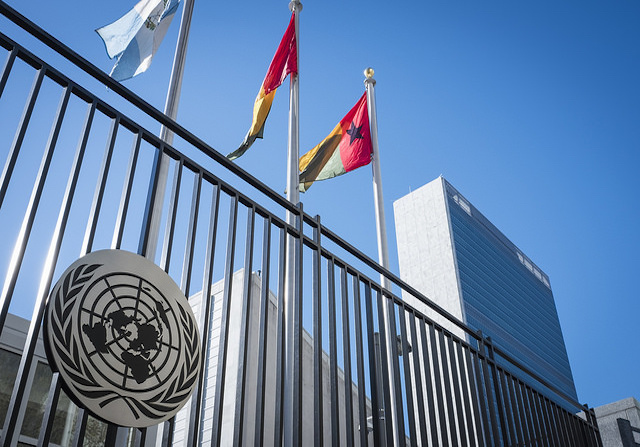
Jun 30, 2017 | Advocacy
A Joint NGO Statement was issued on the occasion of the Twenty-ninth meeting of UN treaty body chairs 27-30 June 2017, New York
This statement includes some reflections and recommendations, by the undersigned organisations (see list on p.6-7), in relation to the programme of work for the 2017 annual meeting.
Some of the comments and recommendations stem from a two-day consultation involving representatives of NGOs, States, treaty body members, OHCHR and academics, which took place in Geneva on 23-24 May 20171.
The consultation focused on developing a strategy for the Treaty Body strengthening process.
A report will shortly be made public.
The comments and recommendations below are structured around the substantive treaty body chairs meeting agenda items.
Universal-MeetingTreatyBodies-Advocacy-2017-ENG (full text in PDF)
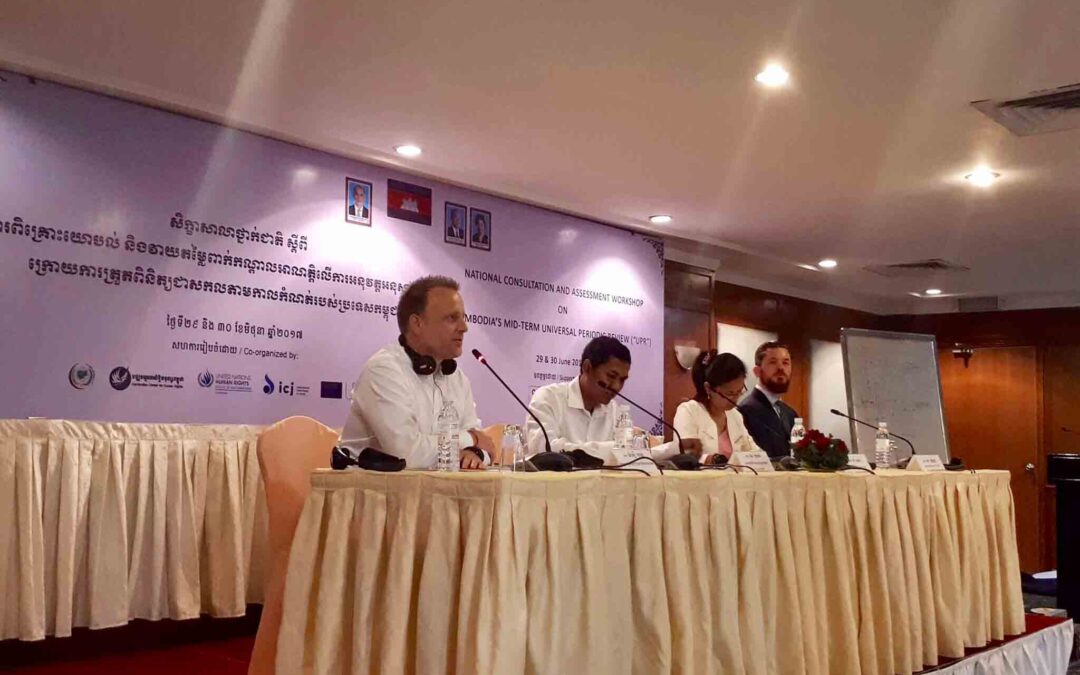
Jun 30, 2017 | News
On 29 and 30 June, the ICJ co-organized a workshop for Cambodian civil society on the UPR.
The workshop was organized with the Cambodian Center for Human Rights, the Cambodia Country Office of the Office of the High Commissioner for Human Rights, UPR Info, and the Cambodian Human Rights Committee on the mid-point review of the Human Rights Council’s (HRC) Universal Review (UPR) of Cambodia.
The Royal Government of Cambodia (RGC) underwent its second UPR in January 2014.
The objectives of the workshop were to:
1. conduct a comprehensive mid-term assessment of the progress and challenges as of late June 2017 of the RGC’s implementation of those recommendations made during the second UPR cycle of Cambodia that the RGC had accepted with a view to informing advocacy around the September 2017 session of the HRC;
2. To take stock of the situation of UPR implementation to provide a basis for preparation of NGO shadow reports during the 3rd cycle of the UPR;
3. To discuss a specific set of UPR recommendations among relevant government bodies and civil society organizations in order to build relationships and raise awareness of the recommendations;
4. To advocate for the full implementation of the recommendations accepted during the second UPR cycle of Cambodia; and
5. To increase awareness of and demand among the Cambodian public for the implementation of the accepted UPR recommendations and to increase awareness of the HRC and UPR process.
Kingsley Abbott, Senior International Legal Adviser for Southeast Asia for the ICJ, moderated a panel discussion on “developing strategic advocacy plans for monitoring the implementation of UPR recommendations” and delivered a presentation on “strategies to effectively implement recommendations and lessons learned from other countries” focusing on past UPR cycles of Thailand Lao PDR.
After a comprehensive review of the recommendations accepted by the RGC during the last UPR cycle it was determined that many of the recommendations had not been implemented.
Civil society agreed that it was important to further strengthen coordinated efforts to monitor and conduct advocacy around the UPR process, engage constructively with the RGC, and begin preparation for the third UPR cycle focusing on lessons learned from the last cycle and regional experiences.
Contact
Kingsley Abbott, ICJ Senior International Legal Adviser for Southeast Asia, t: +66 94 470 1345 ; e: kingsley.abbott(a)icj.org









